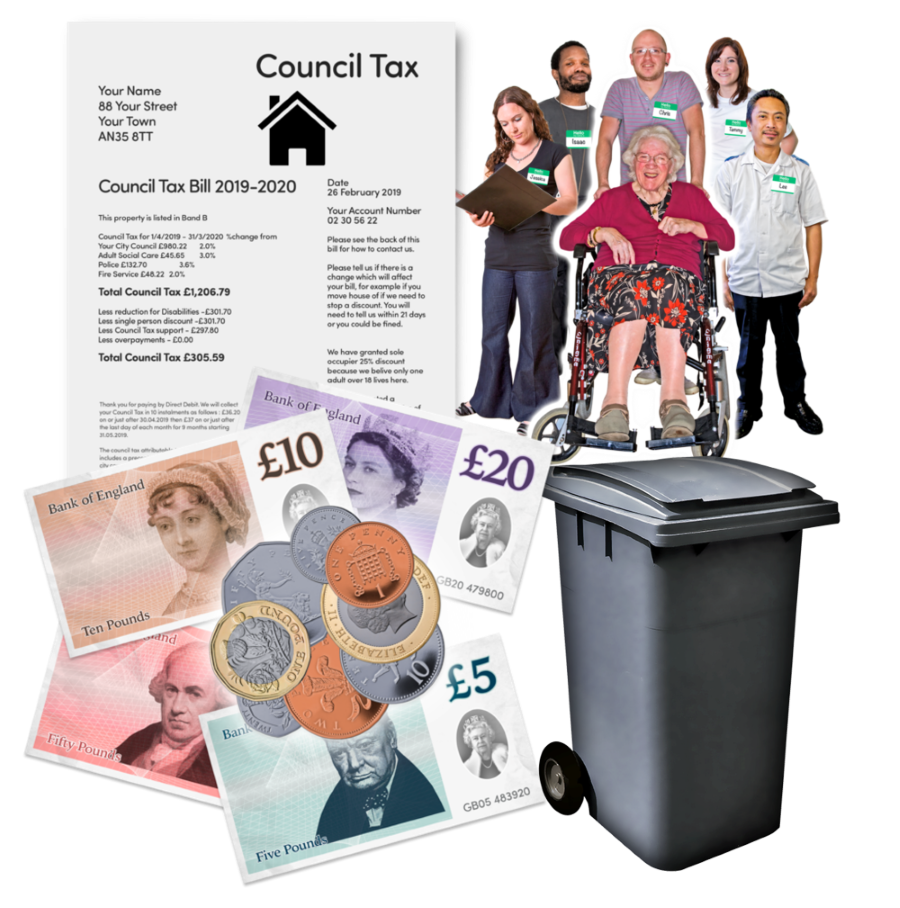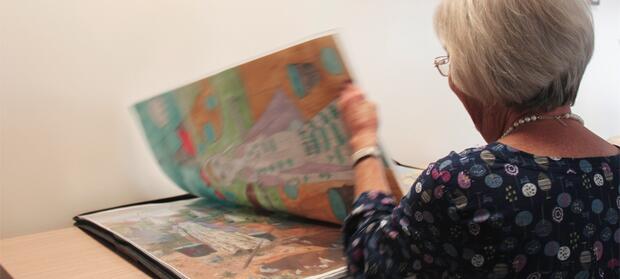What is a discretionary trust?
A trust
 A Trust looks after money for a person or a group of people.
is a way of looking after property or money so that it can help a person who is not able to look after the assets for themselves.
A Trust looks after money for a person or a group of people.
is a way of looking after property or money so that it can help a person who is not able to look after the assets for themselves.
A
discretionary
 Discretionary means it is up to somebody to decide if you get something.
trust is a special form of trust which gives all the decisions about how the assets are looked after and how they are used, to named trustees.
Discretionary means it is up to somebody to decide if you get something.
trust is a special form of trust which gives all the decisions about how the assets are looked after and how they are used, to named trustees.
Unlike many other trusts, wealth left or accumulated in a fully discretionary trust does not affect the beneficiary's eligibility for means-tested benefits or entitlements.
In this video, Julie Schwarz, recently retired as director of Mencap Trust Company, talks about the benefits of using a discretionary trust
service
 A service gives people what they need, like healthcare services that help people when they are ill, and support services that give people support.
and the Mencap Trust service.
A service gives people what they need, like healthcare services that help people when they are ill, and support services that give people support.
and the Mencap Trust service.
Frequently asked questions
Read our answers to some frequently asked questions about setting up a trust.
Why should I set up a Trust?
If a person has more than £16,000 they lose their eligibility for means-tested benefits. Losing means-tested benefits can also mean losing a support package that has been carefully built up over the course of someone’s life. Once the money is spent and the person is eligible for means-tested benefits again, this support package must be renegotiated — often from scratch.
A discretionary trust protects against this, while safeguarding vulnerable individuals who might have come in to a significant capital sum, from financial abuse.
Also, money in trust is like a savings account that can be managed with a view to it lasting a person for the rest of their life, therefore safeguarding the money from been wasted or spent in a reckless way.
What is a letter of wishes?
A letter of wishes sits alongside the trust deed. It often includes information about your loved one’s interests and preferences, and family connections. It guides trustee decisions, but is not legally binding.
A letter of wishes can be updated throughout the lifetime of the settlor, as often as they wish.
How do I set up a Trust?
Mencap Trust Company can act as the trustee of an individual trust you set up with the company. We will work with the beneficiary's family and supporters, and will put the wishes and best interests of the beneficiary at the heart of our decisions.
- Set up a standard trust with MTC with an initial amount of £5. The charge for setting up the trust is £465 for 1 settlor, and £475 for 2 settlors, including
VAT
 VAT is also called Value Added
Tax
VAT is also called Value Added
Tax
 Tax is the money that pays for things like schools, hospitals and the police. There are different types of taxes like
income tax
Tax is the money that pays for things like schools, hospitals and the police. There are different types of taxes like
income tax
 Income tax is the money that is taken out of the money you earn every month. It helps to pay for things we all need like hospitals and schools.
, VAT and
council tax
Income tax is the money that is taken out of the money you earn every month. It helps to pay for things we all need like hospitals and schools.
, VAT and
council tax
 Council
Council
 A council is also called a
local authority
A council is also called a
local authority
 A local authority is also called a council. They are a group of people who make decisions about some of the things in the area where you live like schools,
social care
A local authority is also called a council. They are a group of people who make decisions about some of the things in the area where you live like schools,
social care
 Social care means the services that give care and support to people who need it.
(support for people), parks and dustbin collection.
. They are a group of people who make decisions about some of the things in the area where you live. These include: schools, social care (support for people), parks and dustbin collection.
Tax is the money that people pay to the
council
Social care means the services that give care and support to people who need it.
(support for people), parks and dustbin collection.
. They are a group of people who make decisions about some of the things in the area where you live. These include: schools, social care (support for people), parks and dustbin collection.
Tax is the money that people pay to the
council
 A council is also called a
local authority
A council is also called a
local authority
 A local authority is also called a council. They are a group of people who make decisions about some of the things in the area where you live like schools,
social care
A local authority is also called a council. They are a group of people who make decisions about some of the things in the area where you live like schools,
social care
 Social care means the services that give care and support to people who need it.
(support for people), parks and dustbin collection.
. They are a group of people who make decisions about some of the things in the area where you live. These include: schools, social care (support for people), parks and dustbin collection.
. It helps to pay for things like social care (support for people), parks and dustbin collection.
.
. VAT is the extra money you pay when you buy things. The money goes to
the government
Social care means the services that give care and support to people who need it.
(support for people), parks and dustbin collection.
. They are a group of people who make decisions about some of the things in the area where you live. These include: schools, social care (support for people), parks and dustbin collection.
. It helps to pay for things like social care (support for people), parks and dustbin collection.
.
. VAT is the extra money you pay when you buy things. The money goes to
the government
 The Government are the people who run the country. The Government decide how much tax people should pay and how things like the National Health Service (NHS) should work.
to pay for things like schools and hospitals.
. There is also a one off charge of £460 for the first settlement into the trust fund. this is charged when the trust is activated.
The Government are the people who run the country. The Government decide how much tax people should pay and how things like the National Health Service (NHS) should work.
to pay for things like schools and hospitals.
. There is also a one off charge of £460 for the first settlement into the trust fund. this is charged when the trust is activated. - You can arrange to leave the trust a further sum of money under the terms of your will – we recommend that you see a practising solicitor and make a new will.
- On your death, money will be paid to the trustees and trust will be fully activated.
- Tell others about the trust you have set up, and consider making a lifetime settlement.
What is a lifetime settlement?
A gift put into the trust during your lifetime gives you the opportunity to see Mencap Trust Company in action, and allows you to help your loved one learn how to use the trust well.
The death of a parent can end the way of life the beneficiary knew, particularly when living in the family home. A lifetime settlement ensures we have resources to support your loved one straight away. The granting of probate can take months and the administration of your estate can take more than a year.
Your solicitor can advise on other ways of providing cash for the period between death and granting of probate.
What and who is a Trustee?
A trustee is the person or body responsible for the assets (which might include money and/or property) held in trust. Mencap Trust Company acts by its voluntary directors act as the sole trustee of all of our trusts, and carefully, the directors decide how each each trust fund is managed, and spent.
Who are the 'settlors'?
The majority of settlors are parents, but we also have grandparents, siblings, aunts, uncles, other family members and friends.
Anyone setting up a trust is called a 'settlor'. A settlor is gifting the money to the trustees for the benefit of the beneficiary
How does a discretionary trust work?
The Trust Company accepts responsibility and has complete discretion for all decisions affecting the use and investment of funds. The beneficiary does not have an automatic entitlement to trust funds. For this reason the trust cannot impact on means tested benefits and entitlements. The Trust Company holds the assets in trust, to maintain and manage throughout the beneficiary’s life.
Is money gifted to a Mencap Trust exempt from inheritance Tax?
No. Mencap Trust Company is a not-for-profit company. It is not a charity. The money placed in trust is for individuals, not for a charity. The exemption from inheritance tax given to charitable trusts does not apply to discretionary trusts.
Would you recommend setting up a Disabled Persons Trust?
Families tend to think that because their loved one is disabled, and because there is a special and tax efficient trust called a Disabled Persons Trust, it must be the right choice for them. But it isn’t that simple, and has to be thought through for each family scenario.
A Disabled Persons Trust can offer potential tax advantages in some cases. The savings in tax depend on the size of the taxable estate, the level of the beneficiary's other income and the value of the trust fund, as well as how long the fund is likely to run for, and how it will be managed and used. And the impact of the lost flexibility depends on the level of the beneficiary's income.
While we are offering a DPT option we will not recommend it specifically, and will always tell potential settlors to talk through all their options with experienced and qualified professionals.
We want other family members to act as trustee and use Mencap Trust Company, if this doesn't work out. Can we do this?
The most important thing about a trust is that you choose the people you trust to act as trustee. Often this is younger family and friends, and this is good – Mencap Trust Company is not right for everyone.
Sometimes settlors or family members want Mencap Trust Company to take over as a substitute trustee should their first choice of trustee decide to retire. Unfortunately, Mencap Trust Company cannot generally take over as trustee at a later date if the trust was set up with individual trustees. If you want Mencap Trust Company to be able to do this, you should ask your solicitor to add the necessary wording at the outset. Alternatively, individual trustees can often transfer trust funds to a new trust with Mencap Trust Company as trustee if they do not want to continue as trustees.
The Mencap Trust Company relationship managers work with the family members and the important people in the beneficiaries life. They can be involved in reviews and supporting the beneficiary to make requests to the trustee.
In addition, trusts must be consistent with the Mencap discretionary trust deed, so that it can be managed alongside our existing trusts.
Will you help me complete the paperwork?
Yes. Your first step is to talk to your solicitor about our service. If you then choose us we will guide you through the paperwork, and confirm that the trust deed is sealed and safely stored. Every two years we will check your details are up-to-date. When the time comes we will help the beneficiary and the people important in his or her life to access the trust.
Should I add funds to the trust during my life time?
Making a gift to the trust during your lifetime, is called a lifetime settlement.
A lifetime settlement gives parents the opportunity to see the Trust Company in action, and allows them to help their loved one learn how to use the trust well. We have seen how the death of a parent can end the way of life the beneficiary knew, particularly when living in the family home. A lifetime settlement ensures we have resources to support your loved one straight away. However, if you decide not to make a lifetime settlement, a solicitor can advise on other ways of providing cash for the period between death and granting of probate.
I have a pension. Can that be placed in trust?
You can ask your
Pension
 A pension is money you get when you are older to pay for the things you need. You can pay money into your pension when you are working so there is more money for when you are older.
Trustee to put any remaining
pension
A pension is money you get when you are older to pay for the things you need. You can pay money into your pension when you are working so there is more money for when you are older.
Trustee to put any remaining
pension
 A pension is money you get when you are older to pay for the things you need. You can pay money into your pension when you are working so there is more money for when you are older.
funds into a discretionary trust payable to a vulnerable dependant.
A pension is money you get when you are older to pay for the things you need. You can pay money into your pension when you are working so there is more money for when you are older.
funds into a discretionary trust payable to a vulnerable dependant.
How do the review meetings work?
Our review meetings are at the heart of our service. We have dedicated relationship managers who visit each beneficiary every 1 to 2 years once the trust has been fully activated.
The main aim of the review is to see how the beneficiary is, to learn how to communicate with them, to find out what is important to them and for them. We will meet with the beneficiary and all the important people in their life.
Our meetings often take place in the beneficiary’s home, or somewhere where they feel comfortable. We find out about their health, their lifestyle, financial position, ambitions and challenges.
The relationship managers will make sure that the beneficiary knows how to ask the Trustees for money when they need it. Our relationship managers will be a consistent associate to the beneficiary, with their best interests in mind.
We record the information at the review meetings so that our directors can refer to this when requests come in. This helps the directors to make a decision about the request. The relationship managers will endeavour to have contact with beneficiary between review meetings so that if anything changes, we can be there to help.
How does the beneficiary ask for money from the trust?
There is no limit on the number of times a trust can be accessed. Requests can be e-mailed or posted, often after talking through details with us on the phone. A straightforward request can be approved immediately.
To make a request to the trustee, as request must be made in writing. We have a trust request form which is one A4 page asking for the required information the trustee needs to make a decision.
We know that not all beneficiaries will be physically able to fill in this form so the relationship managers work with them or their carers to support them to submit any requests they want or need.
Other requests are referred to our
volunteer
 A volunteer is someone who helps out by doing work for free.
directors. If a request is refused this is explained and an alternative is often reached.
A volunteer is someone who helps out by doing work for free.
directors. If a request is refused this is explained and an alternative is often reached.
When is a trust ‘wound-up’?
When the primary beneficiary passes away any remaining funds are distributed as specified by the settlor in the original trust deed. Residuary beneficiaries may be siblings, friends and even charities. If no one is named then Royal Mencap Society receives the balance.
Will Mencap Trust act as my executor?
Mencap Trust will not act as executor to your Will.
This is because we focus on running our specialist trust service. We work to ensure that each trust makes a positive difference to the beneficiary's life in the best way for that person, for the whole of their life. We are not solicitors, and we know that we do not have the knowledge or capacity to administer estates.
If there are no family or friends able to act to act for you, you can appoint a solicitor to administer your estate. When family and friends are named as executors, they often work with a solicitor to complete administration.
Finding and funding a place to call home
How can we help?
- We help you set up a discretionary trust
- We can help with practical advice for actions you might take in the next 12 months or so. This starts with a conversation with a GLH expert
- You decide whether you want to buy or rent a home for your loved one, or want them to continue to live in the family home
- We help you arrange the right support.
Mencap Trust Company and GLH build a relationship with the beneficiary and their support team to make sure things continue to work, year after year, as the beneficiary’s needs and ambitions change. Your plan can be updated at any time, to make sure it continues to suit your loved one.
How can the trust help with supported living?
First, your loved one will require a needs
assessment
 An assessment is a way of finding out what help a person needs. When you have an assessment, you might have to go to a meeting or fill in a form.
– carried out by their local social services department – which determines their personal support requirements. Once this assessment has been carried out, GLH can work with you and your loved one.
An assessment is a way of finding out what help a person needs. When you have an assessment, you might have to go to a meeting or fill in a form.
– carried out by their local social services department – which determines their personal support requirements. Once this assessment has been carried out, GLH can work with you and your loved one.
Mencap Trust Company will work with the important people in your loved one’s life to make sure assessments are reviewed as required. The trustee can also help by paying for ‘extras’ to make life more enjoyable.
To find out more, download our brochure (PDF), or call us on 020 7696 6932.
Do you charge for your services?
Mencap Trust Company is a not-for-profit
organisation
 An organisation are a group of people who work together.
but we do charge fees to cover the cost of our work. For the latest information about the fees charged by Mencap Trust Company and our partners please click here.
An organisation are a group of people who work together.
but we do charge fees to cover the cost of our work. For the latest information about the fees charged by Mencap Trust Company and our partners please click here.
Call us on 020 7696 6932 or email mtc@mencaptrust.org.uk if you have a question we haven't answered yet.
Mencap Trust Company general information pack
If you'd like more information on the Mencap Trust Company please download our information pack (PDF).
If you have any questions or would like to get in touch please email mtc@mencaptrust.org.uk.
Glossary of terms
We've created a glossary of some of the words we use that you might like definitions for.
Click the title below to reveal the glossary.
Glossary
Primary beneficiary
The vulnerable person who will benefit from the trust's assets.
Residuary beneficiary
The person(s) or charity(s) named by the settlor in the trust deed. Any assets left when the primary beneficiary passes away are paid to the residuary beneficiary(ies).
Settlor
A person/s setting up a trust: parents and grandparent, siblings, aunt, uncle, other family member or friends. Other people can also put money into the trust.
Trustee
The person or body responsible for the asset held in trust for the beneficiary. Mencap Trust Company is the sole trustee of our trusts. The trustee is represented by 6 volunteer directors who make all decisions about the management and use of each trust fund.
Trust deed
The legal agreement between Mencap Trust Company and the settlor. We have a standard discretionary trust deed and a disabled person's trust deed.
Trust fund
The money or assets held by the Trustee to be used in accordance with the trust deed.
Disabled persons trust
It is less flexible than a standard discretionary trust. Offers potential tax advantages to qualify beneficiaries. A Disabled Person’s Trust is also known as a Vulnerable Person’s Trust.
Discretionary trust
A flexible way for parents, family and friends to leave money and property to help a named individual. The discretionary trust fund does not affect the beneficiary's means-tested benefits or entitlements.
Lifetime settlement
A significant asset placed in trust during the settlor's lifetime, which is then managed by the Trust Company. Parents have the opportunity to discuss with us how the trust is managed and if review visits are appropriate.
Letter of wishes
A statement made by the settlor about how they would like trust funds to be used. This can be updated at no cost at any time. It is morally, not legally, binding.
Useful resources
We've created a number of documents about Mencap Trust Company which you might find useful, including:

